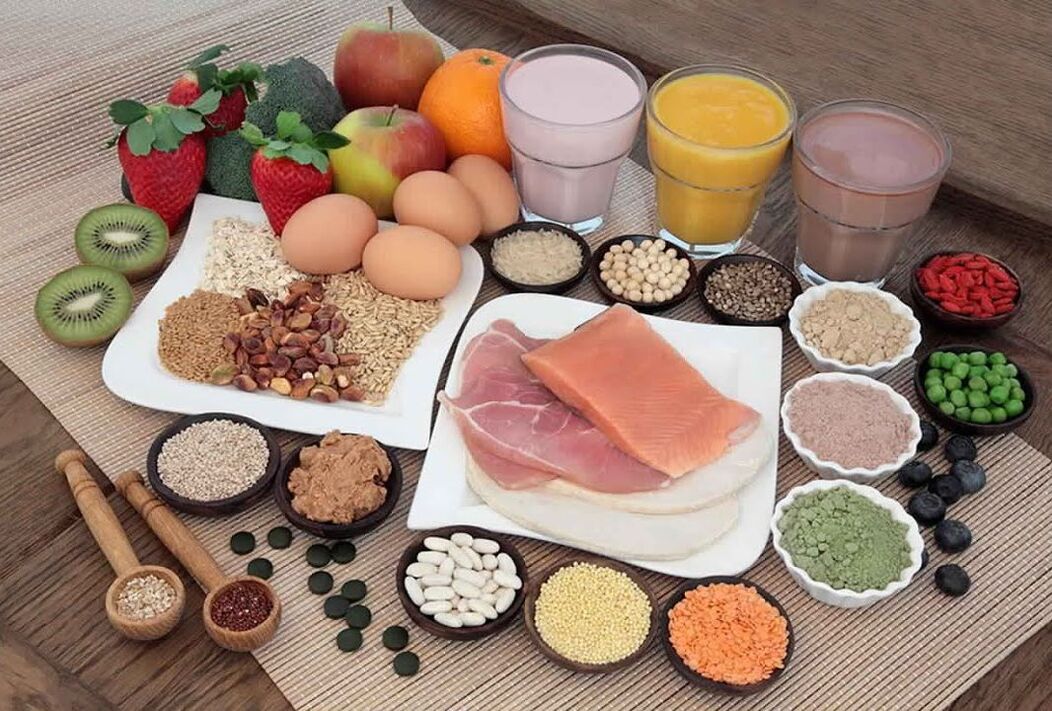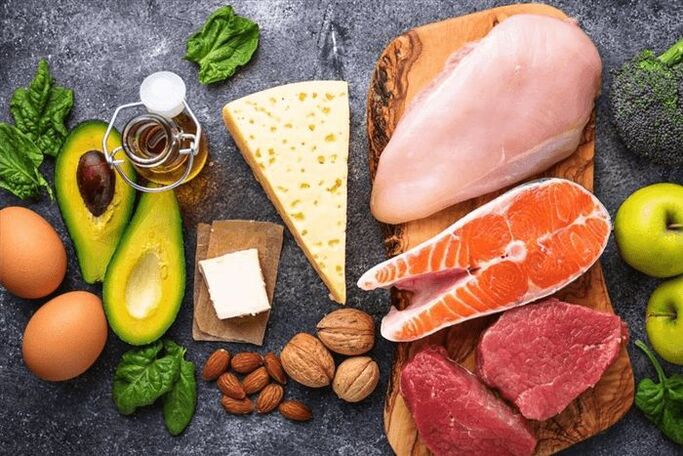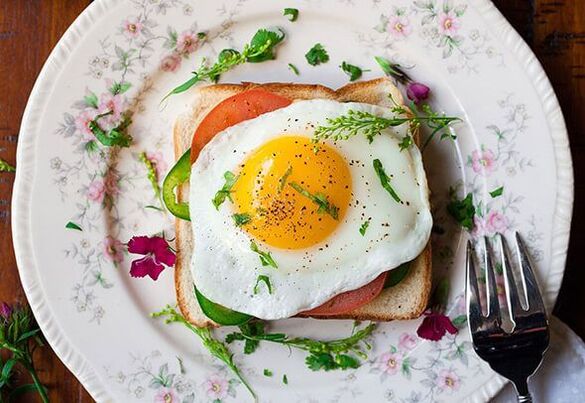First, let's try to understand what a protein diet is and what are its features. First of all, it is worth saying that this diet is based on a large consumption of protein foods: eggs, seafood, meat, fish, dairy products, beans and various cereals. It is worth minimizing the consumption of fats, and especially carbohydrates.
Many people think thatprotein dietquite difficult, however, this is not so. A big advantage is the satiety with food, almost without restrictions. Now let's figure out which foods you should eat in large quantities, because they will be your main diet.
What should you eat on a protein diet?
- milkweed
- Meat and fish
- Low-fat yogurt and cottage cheese
- Legumes
- Vegetables
- Seafood
Foods that should not be consumed on a protein diet:
- Fast food
- Sweet fruits with high calories
- Baking and sweets.
- potato
- Full fat dairy products
- Fatty meat.
Why should you choose a protein diet for weight loss?
Proteins are the building material for our body; they contain a large amount of vitamins, macro- and microelements. The problem for many people trying to lose weight is constant hunger pangs. On a protein diet, you will have enough energy and you will not constantly think about food. You will also not tire your body, it will look attractive, because muscle tissue will practically not be damaged. This is a great option for those who ultimately want to get a toned figure.
How does the protein diet work?
The point is that indigestionand the body spends a large amount of energy on digesting protein foods. To digest lean chicken breast or egg whites, your body must use its own reserves, which are fat. It is at these moments that a powerful weight loss process begins. To achieve maximum results, it is worth adding at least minimal physical exercises.
No one talks about what you have to do all daydisappear into the gym, but training for about half an hour at home will help increase the effect of a protein diet.
Important benefits of a protein diet. First of all, there is a wide selection of products found in many stores. You will not experience a constant feeling of hunger, but you will indulge in food every time and enjoy it. Agree, even a piece of lean meat, cooked quite tasty, looks much tastier than the freshest leaves of lettuce or green apple. There is a large selection of recipes that are suitable for people who eat protein foods.
Many point to the important advantage of a protein diet over others; over time, you can get used to this diet and the diet can become your way of life. Once you've lost a certain amount of pounds, you'll gradually be able to add back your favorite foods without gaining weight. But it is always worth remembering that proteins should remain the main products of your diet.
Disadvantages of a protein diet. Of course, every method of losing weight has its drawbacks, but the protein diet has minor disadvantages. The first and most important thing is that the products you need to eat quite often are not cheap. Seafood will cost you more than a bun or pie you can buy on the way to work. You will also have to spend a lot more time preparing the food. It will not be easy for those who have a sweet tooth, because a protein diet includes almost no sweets, except for dried fruits and fruits with a low fructose content.
You will need to carry containers that will last you all day, especially if you spend a lot of time at work or school. A protein diet involves eating at least 5 times a day.

Basic principles of a protein diet:
- Avoid high calorie foods. It is necessary to exclude alcoholic beverages, fast food, baked products, sweets; dried fruit can be an analogue. Sweeteners should also not be present in your diet. Any food that ends up on your plate should be low in carbohydrates. Remember that even a small amount of sweetener in a cup of coffee can cause a strong appetite, resulting in overeating.
- Drink more water. Here we are talking about clean water and not about different drinks in the form of coffee, tea or juices. When you are on a protein diet, you should drink at least 2 liters of water a day. Keep a small bottle with you and refill constantly, so you will remember to take a few sips, even if you are not at home or in an institution.
- Minimize fat intake. If your diet contains fatty types of cheese, fatty cottage cheese, nuts or butter, consume them before lunch, so that the body spends energy in time and excess calories will not be stored as fat. Protein foods go well with cucumbers, tomatoes, broccoli and low-glucose fruits.
- Exercise stress. In any case, you will need to supplement your protein diet with exercise. This way you will achieve the desired result faster, you will speed up the metabolism, you will improve the absorption of protein foods and you will be able to burn more calories than you consume and this is the secret of healthy weight loss.
Who should think carefully about choosing a protein diet?
First of all, those who suffer fromdiseases of the gastrointestinal tract, as well as from renal failure. A protein diet is undesirable for the elderly, because the body has to process a fairly large amount of protein food, and if there is an opening with the heart or blood vessels, the idea should be abandoned altogether.
Sometimes when illiterateusing a protein dietblood clotting can change, and as a result there is a risk of blood clots. Therefore, do blood tests in advance and play it safe, so that weight loss does not turn into health problems for you.
Protein diet for weight loss

The time of sun, relaxation, clothes and bikinis is behind us. Beautiful ladies have already managed to relax a little and even treat themselves to something very tasty and no less "too" high in calories. Undoubtedly, small joys make everyday life brighter and more positive. The main thing is to tell yourself to stop in time! Otherwise, the appearance of excess weight too quickly and as the experience of losing weight shows, will bring uncertainty, negativity and problems in your life for a long time.
But what if time is wasted? How to quickly return to normal at home? Is a protein diet effective for every day?
Does it have to be perfect?
Before we talk about diet, let's understand if there is such a thing as "ideal weight". It seems that the answer is absolutely clear, because the whole industry of fashion and "healthy" lifestyle tells us every day about the need to meet certain standards of beauty and, apparently, health. Ideals that were not invented by us and, of course, have nothing to do with understanding human nature and the biological mechanisms of our functioning. Despite this, we are motivated in every possible way to strive for certain standards, to show results in the pool, gym and running on the road. The tragedy of the situation is that we do things that are very right for our bodies, not because they bring pleasure and benefit, but only for the sake of compliance. We don't monitor our well-being, we don't track the signals the body gives, we measure and weigh our bodies! And, as a result, we only make the situation worse.
Everyone is inspired, accomplished, ready to act, but where do you start? And you have to start with your definition of non-ideal weight. The same, individual for each of us, but causing the same feeling of discomfort and dissatisfaction.
What is a non-ideal weight?
Try typing in any search engine a question to determine your ideal weight and you will get links to dozens of calculators and tables. And none of them will consider:
- your heritage (genetic predisposition);
- the presence of chronic diseases;
- the number of fat cells in your body and their ability to store fat;
- the metabolism (metabolism) in your body;
- your lifestyle - the presence of stress, sleep and wakefulness, your mobility, the quality and manner of your diet.
If you put everything together, it becomes clear that each of us has our own individual non-ideal weight. How do you determine when it's time to act? If you are experiencing one or more of the following, your weight is far from ideal:
your weight has a negative impact on your health - your general health has deteriorated, you get tired faster, your joints and back are bothering you for the first time, shortness of breath has appeared, blood pressure rises periodically, bowel function leaves much to be desireddesired;
weight begins to make uncomfortable adjustments in your life. You can't do your usual activities (anything that requires mobility and physical endurance), you have to limit yourself in clothing, you feel awkward when you're on public transport or crowded places, you start to adjust your life and planswork considering your weight.
Remember, if you seriously decide to take care of yourself, start by visiting a nutritionist and endocrinologist. This will be the best thing you can do for yourself. Only specialists in the field of medicine and proper nutrition, together, can help you maintain health and improve the quality of your life. Do not forget about the need for constant physical activity in your life.

What is a protein diet?
How can you adjust your menu to lose those pounds that are preventing you from living a full life? A high-protein diet can help with this - a diet based on protein-rich foods, as well as a significant restriction of carbohydrates and fats. Using this nutritional method, you can lose 14 kg within 3 months.
The basic principle of a protein diet is to eat foods that contain proteins that regulate the metabolism in our body. In this way, it is possible to avoid the main disadvantage of any diet - a decrease in protein intake in the body, which, in turn, leads to rapid depletion of the body (internal organs, not receiving enough protein, begin to pull them out of the muscle tissue). All this leads to weakness, poor physical health and sagging skin.
Benefits of following a high protein diet
The advantages that distinguish the protein diet from any other type of diet seem quite significant:
- maintaining a healthy muscular system;
- the ability to combine diet with heavy physical activity;
- the impossibility of developing such a painful complication as anorexia;
- absence of an exhausting, stressful feeling of hunger (protein foods are absorbed by the body within 3-4 hours);
- Protein diet dishes include a large amount of fiber, which ensures the smooth functioning of the intestines;
- due to rather slow, gradual weight loss, without much effort, it is possible to maintain the required weight after exiting the diet;
- good health - complete absence of weakness, dizziness and nausea, which are typical for other types of diets;
- flourishing appearance, the real rejuvenation of the body takes place - the condition of the skin, hair and nails improves.
It is important to remember that the maximum effect for the health of your body can be achieved only by following the rules of dietary nutrition in combination with physical activity; all their organs and systems must be trained.
Disadvantages and contraindications of a protein diet
When you decide to rebuild your diet in accordance with the principles of a protein diet, remember - there is no ideal diet! Each diet is accompanied by certain restrictions or exceptions, which means that the load on your body inevitably increases. It is for this reason that we cannot fail to mention the disadvantages of following a protein diet.
The protein diet should be short-term. Long-term intake of protein foods leads to problems with the skeletal system (predominant consumption of proteins leads to the leaching of calcium from bone tissue, which makes bones very fragile).
Prolonged restriction of carbohydrate intake can negatively affect overall performance.
The nervous system is also under attack, responding to the lack of a sufficient amount of fat in the diet - the main material for the reproduction of nerve cells. The main signs of this condition are increased irritability and nervousness.
A long-term protein diet can disrupt the balance of blood particles - the production of hemoglobin increases significantly.
Protein foods leave behind a large amount of "decomposition products", which leads to an increase in the load on the kidneys (for their excretion).
Protein diet menu
The protein diet menu should be built on the basis of several principles that guarantee the achievement of the necessary results (for example, weight loss by 10 kg):
Proteins make up at least 60% of the total diet.
Refusal from constant eating; for this purpose, preference is given to protein products with a long digestion cycle.
There should be at least 5 or 6 meals during the day and the interval between them should not exceed 3 hours.
Avoid redness; all dishes must be prepared by baking, boiling or steaming.
To better balance your diet, you can include some vegetables and fruits in your diet.
Having regular physical activity in the body.

Chicken, turkey, beef, rabbit
Exceptions: lamb, pork (high fat content)
Low-fat fish
(not more than 4% fat)
Pink salmon, pollock, cod, navaga, perch, pike perch, grayling
Milk and fermented milk products no more than 3-5% fat
Kefir, yogurt, cottage cheese, hard cheeses
Rice, oatmeal, buckwheat
All "green" vegetables, as well as any other in small quantities, 2-3 times a week
Sour fruit drinks and compotes and homemade juices without sugar (diluted 1: 1 with mineral water), herbal teas and their infusions, coffee without sugar
Olive, linseed, sunflower - in strictly limited quantities
Among the products prohibited for consumption, some main ones can be identified:
- flour products - pasta, pastries, bread;
- sugar and products and dishes containing sugar - baked goods, ice cream, chocolate, sweets, ready-made juices, fruit drinks, etc. ;
- any sausage;
- potatoes and dishes containing them;
- alcohol and any product containing alcohol;
- fast food and semi-finished industrial products.
Important! Regardless of which protein diet option you plan to use (short-term or long-term), remember that dietary periods cannot be more than once every 6 months.
Protein diet: list of allowed foods and recommendations
During the protein diet, the following are allowed:
- any meat - pork, beef, poultry with minimal fat content;
- seafood, eggs, low-fat cottage cheese;
- raw vegetables: cabbage, cucumbers, herbs, tomatoes;
- Lemon juice or olive oil is used as a sauce;
- Oats and buckwheat are allowed 2 times a week.
- sweets - here are all confectionery products (cakes, cookies), sugar and sweet fruits;
- bakery products, pasta, foods fried in fat;
- grains, potatoes, butter.
When following a protein diet, you should follow the following recommendations:
- you should eat 5-6 times a day, the last time no later than 2 hours before bedtime;
- drink at least 1. 5 liters of mineral water without gas or clean water every day;
- any alcohol is prohibited;
- If you want, it is allowed to eat some unsweetened citrus fruits or apples for a snack.
What protein diet programs are there?
Many protein diet programs have been developed. There are both pure protein diets and those with different variations: protein-vegetable, protein-fruit, protein-vitamin and others.
Protein diet for a week: menu options
Protein diet options for 7 days
1 option
- Breakfast: 150 grams of beef with a whole grain bread, a cup of tea or coffee;
- Snack: 1 apple;
- For lunch: boiled chicken breast (150 grams) with vegetable salad (200 grams);
- Afternoon snack: 1 glass of low-fat yogurt or kefir;
- For dinner: boiled sea fish (200 grams) with vegetable salad dressed with lemon juice.
Option 2
- Breakfast: 150 grams of low-fat cottage cheese, tea, coffee;
- Snack: 1 any citrus fruit;
- For lunch: boiled beef with vegetables (150 grams);
- Afternoon snack: 1 cup of low-fat kefir with diet bread;
- For dinner: 200 grams of lean fish boiled with fresh vegetables.
Option 3
- Breakfast: boiled chicken fillet (200 grams), tea or coffee;
- Snack: 1 apple;
- For lunch: 200 grams of boiled beans with a portion of vegetable salad;
- Afternoon snack: 200 grams of low-fat yogurt with diet cookies;
- For dinner: 150 grams of boiled beef with 150 grams of cabbage salad, seasoned with 1 tbsp. l. olive oil.
Option 4
- Breakfast: 1 glass of low-fat kefir with diet cookies;
- Snack: 1 fruit without sugar;
- For lunch: 200 grams of boiled chicken breast, 1 glass of apple juice;
- Afternoon snack: 1-2 boiled eggs;
- For dinner: 200 grams of boiled fish, 150 grams of fresh vegetables.
Option 5
- Breakfast: 150 grams of boiled turkey, 1 apple, tea or coffee;
- Snack: 1 glass of apple juice, 1 diet cookie;
- For lunch: boiled fish (200 grams) with a piece of cereal bread;
- Afternoon snack: 1 glass of low-fat kefir;
- For dinner: 150 grams of boiled beef with vegetable salad.
Option 6
- Breakfast: 150 grams of low-fat cottage cheese and tea;
- Snack: 1 grapefruit;
- For lunch: boiled beans with vegetables;
- Afternoon snack: 1 glass of kefir;
- For dinner: boiled sea fish (200 grams) with fresh vegetable salad.
Option 7
- Breakfast: 1 glass of skimmed milk, 1 diet cookie;
- Snack: 1 apple without sugar;
- For lunch: vegetable soup with champignons;
- Afternoon snack: 50 grams of low-fat cottage cheese;
- For dinner: boiled beef (150 grams) with fresh salad.
Short-term (fast) protein diet option (3 days)
The main feature of such a "fast" protein diet is the complete absence of food, strict adherence to 3 meals a day and the prohibition of any physical activity, even the smallest. At the same time, drinking herbal teas without sugar is allowed between meals.
- breakfast - 1 boiled chicken egg, cooked in any form (boiled, boiled, etc. ), can be replaced with quail eggs, taking into account the calorie content;
- lunch and dinner - 150-200 grams of low-fat cottage cheese (not more than 3-5% fat) and tea without any sweetener (the use of sugar and honey is unacceptable);
- fluid consumption - at least 2 liters per day;
- last meal no later than 18: 00.
When leaving a short-term protein diet, follow the principle of gradualness, so as not to harm your health, you should add foods and increase their amount gradually, for 1-2 weeks. Start by adding whole grains and fruits, then add milk and fermented milk products (look at the fat content of the products).
Unfortunately, as much as we would like to, it is difficult to call such a diet balanced; during the period of a protein diet (especially short-term), the body experiences an acute lack of vitamins and minerals. To minimize the possible negative consequences of such restrictions, about a week before the diet, start taking vitamin complexes designed for long-term use (from 1 to 3 months).
When you decide to start a protein fast diet, evaluate not only your current physical condition, but also the emotional and intellectual stress that can await during this period. Give up the diet (or change it in time) if:
- you have recently suffered from a somatic illness;
- you are facing a period of serious physical, intellectual or emotional stress;
- you are over 50 years old;
- you have problems with the liver and/or kidneys, as well as with the cardiovascular system;
- you have had (or are experiencing) blood clotting disorders (increased risk of thrombosis) and signs of diabetes.
And, of course, using any diet is absolutely impossible during pregnancy and breastfeeding.
If you want to plan a menu for a protein diet for a longer period, for example, a month, then it is better to contact specialists. They will not only be able to create a diet based on the allowed calorie content and the list of allowed foods, but will make it as balanced as possible.
Dukan diet menu
The Dukan diet also refers to a type of protein diet, which according to the menu is divided into different phases: attack, navigation, protein-vegetables, consolidation, stabilization. The first phase of the attack is the most critical, here is its approximate menu:
- For breakfast: 2 egg white omelets with low-fat milk and some herbs.
- Snack: one and a half spoons of oats with bran.
- For lunch: 200 grams of boiled beef.
- Snack: boil 200 grams of prawns or other seafood.
- For dinner: 200 grams of boiled beef or lamb.
results
The effect of weight loss on a protein diet, as a rule, becomes visible within a week, when the first 4-5 extra kilograms are gone..The most visible result will be after three weeks, when the excess weight will disappear even more and the relief of the muscles will become visible. After all, a protein diet is designed to get rid of fat deposits without losing muscle mass. Fortunately, there are plenty of protein products to restore and "build" muscle.
The greater the initial weight of the person losing weight, the greater the "losses" will be during the diet. For example, if you weigh 100 kg and are obese, you can lose 5-10 kg in two weeks. At the same time, the diet is quite diverse and will not cause an aversion to a specific product, as happens in mono-diets.
It is believed that the optimal period when you can adhere to a protein diet with benefit and without harm to health is 10-14 days. During this time, you can lose 8-15 kilograms.

The right way to get off a protein diet
Experts advise that any diet should be phased out. The protein nutrition system is no exception. You should not immediately jump on your favorite foods, the consumption of which was prohibited during the program. It is best to completely exclude sugar and flour products from your diet.
Except this, you should continue to adhere to the regimen: eat at least 5-6 times a day in small portions, do not eat 2-3 hours before bedtime, drink more water and give up alcoholic beverages.
In the first 2 weeks after a protein diet, physical activity should also increase. This must be done to optimally use the input energy and to maintain the result.
Contraindications
In order not to harm your health, people suffering from the following diseases should avoid a protein diet:
- hepatitis (and other liver diseases);
- arrhythmia (and other cardiac abnormalities);
- kidney dysfunction;
- dysbacteriosis;
- colitis;
- pancreatitis;
- increased thrombus formation;
- joint pain (and all related diseases).
Also, the protein feeding system is not suitable for the elderly, pregnant and lactating women.

































